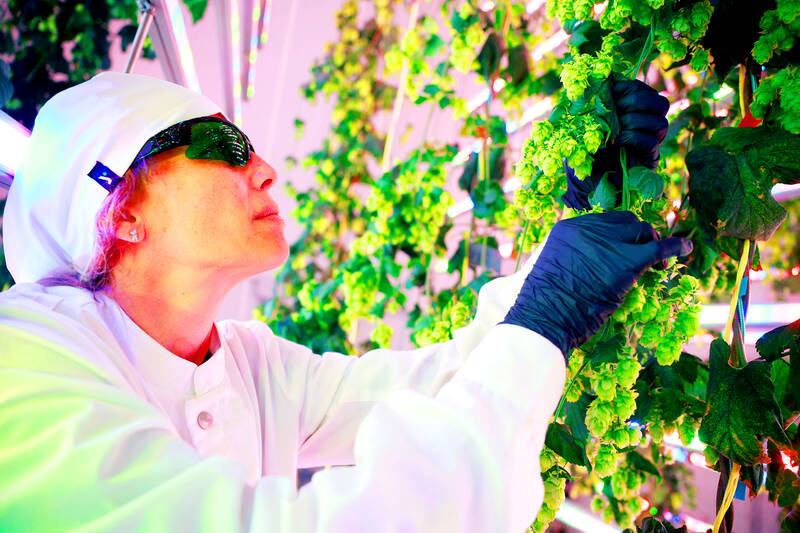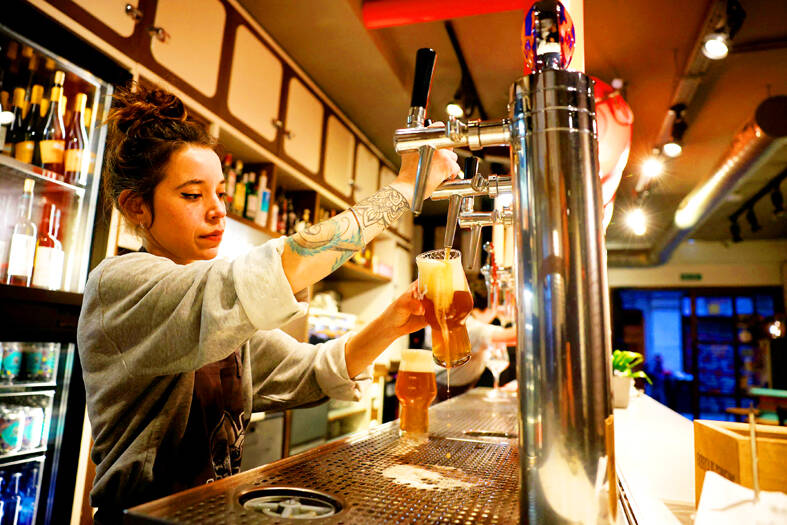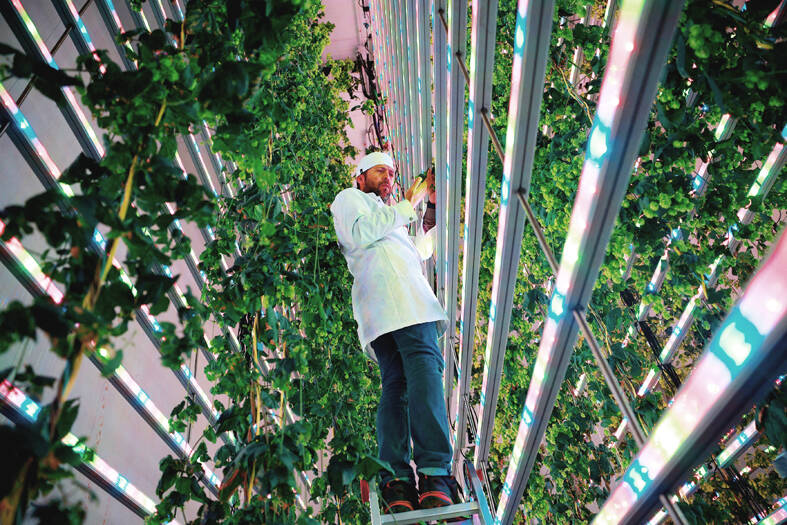In warehouses outside Madrid, twists of hop vines grow under LED lights and close supervision in what their guardians say could be the best way to futureproof the supply of a key ingredient in the world’s most popular alcoholic drink, now threatened by climate change.
Due to their need for “goldilocks” conditions of long summer days and mild temperatures, hops are traditionally grown in temperate climes found in areas like Germany’s Hallertau area, the Czech Republic or the northwestern US.
However, research shows that more frequent droughts and plagues due to global warming are driving down both yields and quality — a growing headache for the beer industry.

Photo: Reuters
US production was down 12 percent year-on-year last year, while German output saw a 21 percent decline and Czech yields fell by more than 40 percent due to abnormally hot and dry growing conditions, growers’ associations say.
Spain’s Ekonoke is seeking a solution by cultivating the water-intensive vines indoors through renewable-powered hydroponic systems that use nearly 95 percent less water than traditional outdoor farming.
“We’re on a mission to save the world’s beer,” Ekonoke chief executive and cofounder Ines Sagrario said.

Photo: Reuters
Warning: Excessive consumption of alcohol can damage your health
The start-up’s 11-member team of agronomists, chemists and biotechnologists tinkers with combinations of light and fertigation — the blending of fertilizers and water — at its test facility near Madrid, seeking the “secret sauce” that best suits each variety.
The ultimate goal is to maximize production of alpha-acids and essential oils that impart the bitter and fruity aromas so cherished by craft beer enthusiasts.
Dozens of sensors hooked to the leaves, roots and stems of the tall-growing climbers measure every parameter, from humidity to carbon dioxide levels, as changing wavelengths from LED lights give the repurposed warehouses a nightclub-like feel.

Photo: Reuters
“These hops have never seen any sunlight, only our own light show,” Ekonoke co-chief scientific officer Javier Ramiro said.
Strict hygiene measures such as protective clothing for staff ensure the space remains pest-free, taking the pesticides on which traditional farming often depends out of the equation.
To fund its research and expansion plans, Ekonoke has partnered with the Hijos de Rivera SA, makers of the popular Estrella Galicia brand, who have developed a limited edition IPA using Ekonoke’s hops that is already on tap in a bar in Madrid’s hip Chueca neighborhood.
Their next step is to upscale production to three rooms of up to 400 plants each from several dozen at a 1,200m2 pilot facility in northwestern Galicia. There, they plan to test automated postharvest processes.
Indoor plantations could ideally be set up next door to brewers, acting as a carbon sink by reusing the carbon dioxide emitted during fermentation to speed up the plants’ photosynthesis and recycling filtered water residues left over from the manufacturing, Sagrario said.
The start-up is also part of industry giant Anheuser-Busch InBev NV’s 100+ sustainability accelerator program.
Anheuser-Busch InBev’s director for global hops procurement, Willy Buholzer, said the key question for “very promising” ventures such as Ekonoke is whether they can grow and sell premium hops that are able to compete against more than 1,000 years of history in a sometimes conservative sector with conservative consumers.
“You should not underestimate traditional [outdoor] hop growers. They always come up with new ideas,” he added.
The most obvious challenge indoor farming faces is its high energy cost, he said.
However, he said he is optimistic that soaring energy prices would normalize, while the added value of a secure supply of special varieties and more frequent harvests resulting in higher yields per hectare could make indoor farming competitive in pricing.
“Demand from breweries is quite inelastic; you can’t make beer without hops and they don’t want to produce less,” Sagrario said.
Ekonoke’s endgame is to set up indoor plantations all across the globe, she said.
“This can be grown anywhere: Madrid, Sevastopol or Timbuktu,” she added.

The US dollar was trading at NT$29.7 at 10am today on the Taipei Foreign Exchange, as the New Taiwan dollar gained NT$1.364 from the previous close last week. The NT dollar continued to rise today, after surging 3.07 percent on Friday. After opening at NT$30.91, the NT dollar gained more than NT$1 in just 15 minutes, briefly passing the NT$30 mark. Before the US Department of the Treasury's semi-annual currency report came out, expectations that the NT dollar would keep rising were already building. The NT dollar on Friday closed at NT$31.064, up by NT$0.953 — a 3.07 percent single-day gain. Today,

‘SHORT TERM’: The local currency would likely remain strong in the near term, driven by anticipated US trade pressure, capital inflows and expectations of a US Fed rate cut The US dollar is expected to fall below NT$30 in the near term, as traders anticipate increased pressure from Washington for Taiwan to allow the New Taiwan dollar to appreciate, Cathay United Bank (國泰世華銀行) chief economist Lin Chi-chao (林啟超) said. Following a sharp drop in the greenback against the NT dollar on Friday, Lin told the Central News Agency that the local currency is likely to remain strong in the short term, driven in part by market psychology surrounding anticipated US policy pressure. On Friday, the US dollar fell NT$0.953, or 3.07 percent, closing at NT$31.064 — its lowest level since Jan.

The New Taiwan dollar and Taiwanese stocks surged on signs that trade tensions between the world’s top two economies might start easing and as US tech earnings boosted the outlook of the nation’s semiconductor exports. The NT dollar strengthened as much as 3.8 percent versus the US dollar to 30.815, the biggest intraday gain since January 2011, closing at NT$31.064. The benchmark TAIEX jumped 2.73 percent to outperform the region’s equity gauges. Outlook for global trade improved after China said it is assessing possible trade talks with the US, providing a boost for the nation’s currency and shares. As the NT dollar

The Financial Supervisory Commission (FSC) yesterday met with some of the nation’s largest insurance companies as a skyrocketing New Taiwan dollar piles pressure on their hundreds of billions of dollars in US bond investments. The commission has asked some life insurance firms, among the biggest Asian holders of US debt, to discuss how the rapidly strengthening NT dollar has impacted their operations, people familiar with the matter said. The meeting took place as the NT dollar jumped as much as 5 percent yesterday, its biggest intraday gain in more than three decades. The local currency surged as exporters rushed to